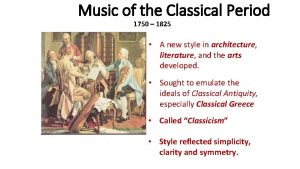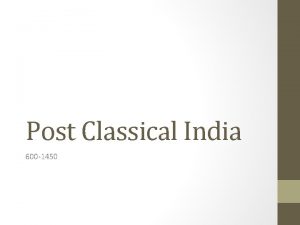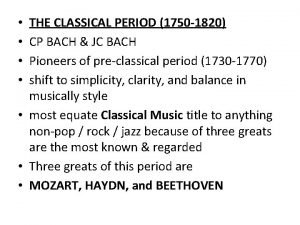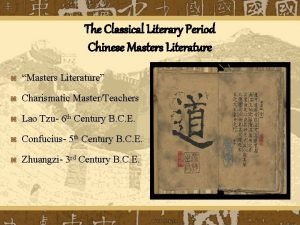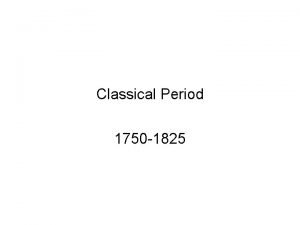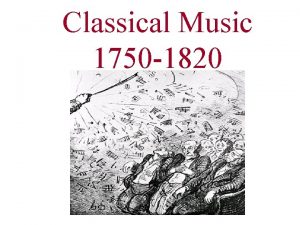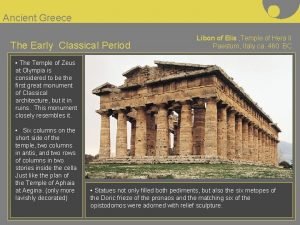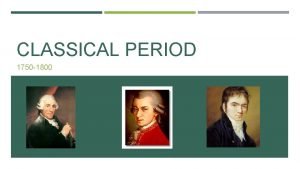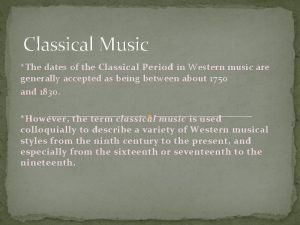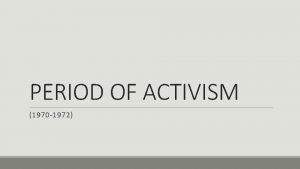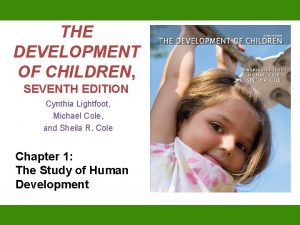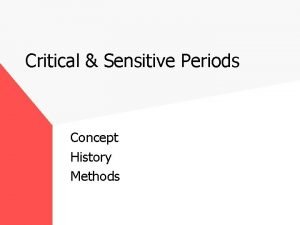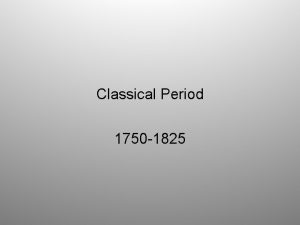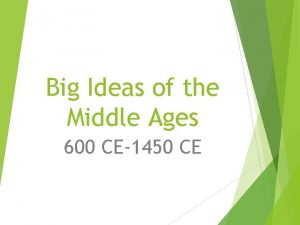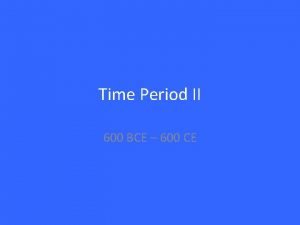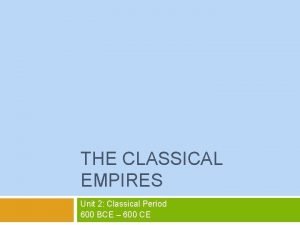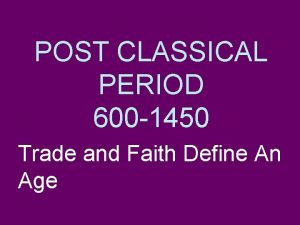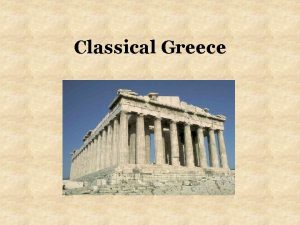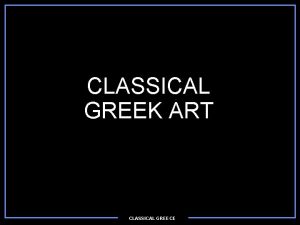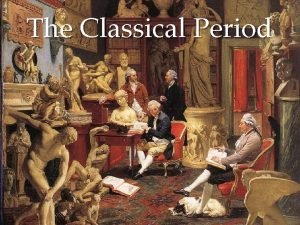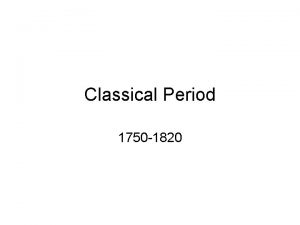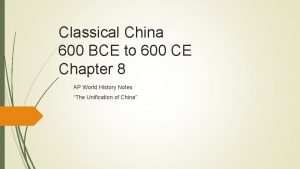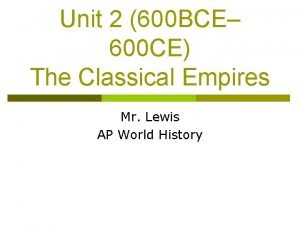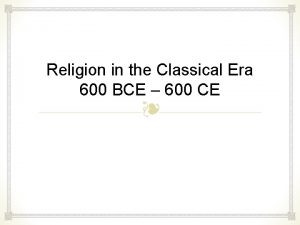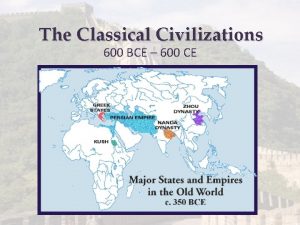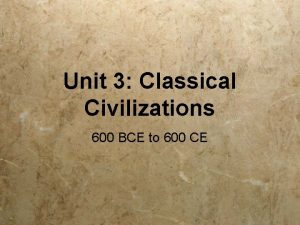Post Classical Period 600 CE1450 CE Parker Claire




















- Slides: 20

Post Classical Period 600 CE-1450 CE Parker, Claire and Spencer

Interactions ● Landholding aristocracies were the dominant class ● Middle East was mainly Islamic ● Europe remained Christian ● The Bubonic Plague

Americas and East Asia ● ● ● Fall of the Han Spread of Neo-Confucianism Sinification in Chinese areas of influence Sui, Tang, and Song Dynasties Aztecs and Incas develop

Africa and Southeast Asia ● Introduction to Islam ● Rise of West African kingdoms (Ghana, Mali, Songhay) ● Indian ocean trade, Sub-saharan trade ● Origins of Hinduism ● Establishment of Delhi Sultanate

Interactions in the Arab World ● ● ● Umayyad and Abbasid Caliphates The crusades Rise of the Ottomans Mongols take territory Sunni vs. Shi’a

Cities ● Acted as urban centers along caravan trade ● Timbuktu ● Constantinople ● Baghdad ● Ghana, Mali, Songhay

Feudalism ● European: Power in hands of different lords Feudal contracts, European worker soldiers, provide military service ● Japanese: At first aristocrats used as military, practice of Seppuku, Peasants act as serfs, treated as property, work on lord’s land

Religious gender roles ● Christianity: Spiritually equal, religious communities for women ● Islam: Gave women inheritance, women secluded from public, patriarchal society ● China: Footbinding in the Song dynasty, patriarchial society

Occurrences After the Fall of the Roman Empire ● Byzantine formed in place of the eastern half because of a larger and more defensible military ● Bubonic plague ● Shift in trade dominance to western Europe ● Rise of new empires, like Kieven Rus, France, and England ● Split between Roman Catholic and Eastern Orthodox christianity

Trans-Saharan Trade ● Traded salt, gold, and ivory ● West african kingdoms: Ghana, Mali, and Songhay ● Timbuktu was a major trading city ● Camels used for trade over routes ● Muslim merchants spread islam

Indian Ocean Trade ● Mainly bulk goods traded ● Trade between south east Asia, India, Arabia and Swahili coast of Africa ● Items like cotton, spices, gold, ivory and timber ● Maritime trade ● Lateen sails created for monsoon winds

Silk Road Trade ● Connected China to Middle East, Africa and Europe ● Luxury items like silk, porcelain, salt, and gold ● Land trade with caravans ● Constantinople ● Mongols took control of trade route

Missionary Outreach ● Islam spread to Africa by merchants on trade routes ● Christianity spread to Ethiopia ● Crusades spread christianity throughout Europe and the Middle East ● Islam, Christianity, and Buddhism had missionaries throughout Asia

Impact of the Mongol Empire ● Silk road trade was protected and encouraged ● Created the largest land empire in the world ● Golden Horde formed the Il-Khanate ● Spread of the Bubonic plague ● Revival of Confucianism in China

Significant Terms ● Arab Caliphates- A group of people in the Islamic state ● Syncretism- Blending of cultural elements, often facilitated through trade ● Feudalism- Political system where nobles offered protection and land for service in agriculture ● Manorialism- Economic system where lords offered land for people to work in exchange for large taxes on food

Significant Terms ● Crusades-Holy wars prompted by the pope to take back land in the Middle East ● Vikings- A group of people from Scandinavia that dominated native people, founded Kievan Rus, but were later conquered by… The Mongols ● Mongol Expansion- Mongols conquered China, Kievan Rus and Persia ● Indian Ocean Trade- Trade in Indian Ocean involving India, China, the Swahili Coast, and Pacific Islands

Significant Terms ● Papacy- Head of Catholic Church that makes religious decisions ● Neoconfucianism- Synthesis of Confucianism and Buddhism that reinforced gender and class distinctions ● Civil Service Exams- Test taken by young noble to be included in bureaucracy ● Sinification- Spread of Chinese culture, most apparent in Korea, Vietnam and Japan

Asia: ● Sinification ● Mongol Expansion ● Rise of Islam ● Hinduism ● Indian Ocean Trade ● Silk Road Trade Africa: ● Spread of Islam ● Swahili Coast ● Sub Saharan Trade ● Christianity ● West African Kingdoms: Ghana, Mali, Songhay Americas: ● Aztecs ● Incas ● Tenochtitlan ● Trade with Polynesia ● Agriculture based Europe: ● Byzantine ● Kieven Rus ● Crusades ● Eastern Orthodox vs. Roman Catholic ● Bubonic Plague

Summary ● Rise of Islam- Spread through trade routes ● Plague- Killed close to half of the world population ● Mongols- Expand to half of Afro. Eur. Asia ● Sinification-Spread of Chinese Culture ● Indian Ocean Trade- Used Monsoon winds to trade bulk goods overseas

Important Dates ● 750 -1258 ce: Abbasid dynasty ● 960 -1279 ce: Song dyansty ● 1054 ce: Split between Eastern Orthodox and Roman Catholic ● 1096 ce: First crusade ● 1211 ce: Beginning of Mongol Conquests ● 1289 ce: Founding of the Ottomans ● 1325 ce: Founding of Tenochtitlan by the Aztecs
 What period lasted from 1750-1825?
What period lasted from 1750-1825? Nilai dari sin 600 + tg 600 adalah
Nilai dari sin 600 + tg 600 adalah Jerome and claire are doing the period of a pendulum
Jerome and claire are doing the period of a pendulum Post classical india
Post classical india Post classical era timeline
Post classical era timeline Post classical east asia
Post classical east asia Classical period orchestra
Classical period orchestra Bach classical period
Bach classical period Romantic ballet era
Romantic ballet era Classical literary period
Classical literary period Terraced dynamics are
Terraced dynamics are 1750 to 1820 classical music
1750 to 1820 classical music Below are the characteristics
Below are the characteristics Classical period characteristics
Classical period characteristics Farnese hercules
Farnese hercules Oath of the horatii characteristics
Oath of the horatii characteristics Classical era dates
Classical era dates In the classical period serious composition was flavored by
In the classical period serious composition was flavored by Period of activism (1970 to 1972)
Period of activism (1970 to 1972) The development of children 7th edition
The development of children 7th edition Critical period vs sensitive period
Critical period vs sensitive period
